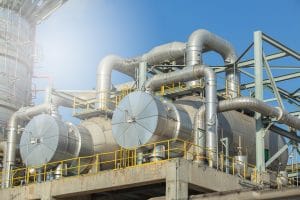 Heat exchangers have long been recognized for the benefits they bring to manufacturing and other industries. Their ability to streamline electrical cooling has been the source of significantly reduced costs and improved efficiency in many different areas. However, the benefits that heat exchangers provide are much more pronounced in some industries than they are in others. For example, companies that operate in hazardous locations, such as the oil and gas industry, rely on thermal management solutions for more than just efficiency. The cooling units they employ must also meet strict safety standards in order to be durable and effective enough to serve their purpose.
Heat exchangers have long been recognized for the benefits they bring to manufacturing and other industries. Their ability to streamline electrical cooling has been the source of significantly reduced costs and improved efficiency in many different areas. However, the benefits that heat exchangers provide are much more pronounced in some industries than they are in others. For example, companies that operate in hazardous locations, such as the oil and gas industry, rely on thermal management solutions for more than just efficiency. The cooling units they employ must also meet strict safety standards in order to be durable and effective enough to serve their purpose.
The need for cooling in hazardous locations
In the oil and gas industry, the machinery and technological equipment used in most locations is vital to every company’s operations. Not only do they accomplish what employees can’t, but are also designed to keep employs safe while operating in the field and elsewhere. Traditional heat exchangers were highly effective in warehouses and other conventional manufacturing settings, but were not originally designed for the especially tough conditions that occur in more hazardous locations. Therefore, many companies relied on conventional solutions like air conditioners and air compressors for their electrical cooling needs longer than companies in other industries had to.
Optimizing heat exchangers for safety and efficiency
The good thing about heat exchangers is that the same heat transfer processes that make them highly efficient and beneficial also make them more easily adaptable to varying situations. For instance, fortifying an HVAC or air compression unit to operate in a hazardous location means tightly sealing and safeguarding a large number of complex, external moving parts and sections. By contrast, heat exchangers are designed to simply transfer electrical waste heat with the help of a cooling fluid that flows inside of the heat exchanger unit. This it makes it easier to fortify a heat exchanger with advanced, high-quality seals and other components necessary for hazardous locations.
The advantages of hazardous location heat exchangers
By bringing high-performance electrical cooling capabilities to operations in hazardous locations, modern heat exchangers have given companies in oil and gas and other industries a significantly and highly important advantage. The efficiency of their operations is dramatically improved, as well as the safety of their employees, as each heat exchanger unit requires significantly less maintenance and few or no repairs. For more information about using heat exchangers in hazardous locations, call Noren Thermal Solutions in Taylor, TX, at 866-936-6736.







